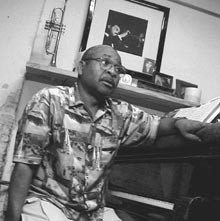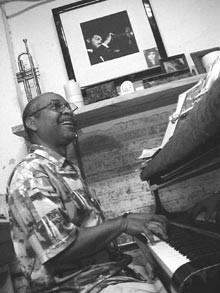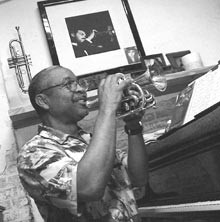"We try to get him to take naps," says Brenda Stacy, his personal assistant, who arranges his appointments and keeps him organized. "He just won't say no to anybody."
Carter has long enjoyed a reputation as a brilliant jazz soloist with a beautiful tone on trumpet and cornet. He also coaxes a lovely sound from the pocket trumpet: a short, squat instrument that can only be described as "cute." The influence of Miles Davis is unmistakable, both in his solid understanding of the jazz idiom and in his willingness to incorporate other musical styles into his own compositions.
He is also a solid rhythm section pianist, much in demand. Transplanted New York saxophonist Rob Hardt speaks of recording a project recently with Carter on horns and piano: "Cecil is, without exception, my favorite local pianist. Piano not being his primary instrument, his artistic sensibility isn't hindered by excessive technique, so he doesn't overplay. What comes out is pure music."
| Cecil Carter, playing around. Photos by Bett Butler |
But I first learned of Carter's teaching ability several years ago backstage at Jazz'sAlive. Students from his San Antonio School of Jazz were scheduled to play the next set, when they discovered there were no music stands onstage. The young musicians panicked, fluttering around him like anxious butterflies. "What'll we do, Mr. Carter?" His answer was positive and firm. "We'll do what we've learned to do: We'll improvise. And we'll go out there and play our hearts out." Minutes later, the horn players were gathered around his single music stand. The rhythm section's charts were perched atop amplifiers and speakers, anchored against the wind by whatever weights were available: towels, spare cords, borrowed clothes pins. And they played their hearts out. The audience loved it.
I recently sat in on a jazz piano lesson with Carter's oldest student, who just celebrated his 84th birthday. Retired physician Dr. Aloysius Thaddeus (known as "Dr. Al") plays the written jazz arrangements slowly, with a lovely legato touch, savoring the sound of the lush chords. Carter is teaching him to construct jazz chords down from each note in the melody. Moving from one chord to the next, he points out how closely related they are, and which notes are common to both. The doctor plays Cole Porter's "How Deep Is the Ocean," stopping to focus on a particular jazz chord in the written arrangement, a B suspended 4. He really likes the sound, the color of it. "Yeah," Carter tells him, "practice that chord around the circle of fifths until you get the hand position."
"This is my therapy session," says the doctor, who has enjoyed music as a hobby since 1929. "I get a thrill doing this." He calls Carter "a marvelous musician, a great arranger."
The next lesson is on trumpet with beginner Nahtee Abrams, who is also the mother of Cecil's youngest student, 7-year-old Jasmine. Carter sets the metronome at a comfortable tempo, and they play together chromatically down the scale, holding each note for eight beats and resting for eight beats. The atmosphere is calm and focused, an almost Zen-like approach. Each note starts a little shakily, but Abrams eventually matches Carter in pitch and in tone, so that by the end of the eight counts, she is producing a beautiful sound — an unusual feat after only four lessons. Abrams, a nurse who started lessons in order to share the musical activity with her daughter, says of Carter: "He's easy to work with — lots of fun. He's good at letting Jasmine be herself, making it fun for her."
Getting Carter to talk about himself is not easy. He is, by nature, modest and self-effacing, and seems genuinely embarrassed by praise. He would much rather speak of his two daughters. Artistic talent is a family trait: Knicole, a dancer by training, is an international movie editor based in Amsterdam; and Lisa recently played at Carnegie Hall as a winner of the Concord International De La Musique classical piano competition. I did learn that he began studying violin at age 7, and like many jazz musicians, he was drawn to the melodies of composers like George Gershwin and Jerome Kern. "I was listening to Fred Astaire/Ginger Rogers musicals, and fell in love with that music." Three years later his family moved to Ft. Worth, then still a rural town, a cultural desert. His musical journey became as rocky as the surrounding ranch land. "A lot of people at that time thought that music was inappropriate for a little black child to be listening to. I had to learn to fight in the streets." He managed to continue his musical studies and joined the Army, serving as musical director of the 3rd Army Soldiers' Show, where he oversaw production of touring shows to boost troop morale. He also served in the 5th Army Band.
Retiring from the service after 20 years, he found himself much in demand as a soloist and never lacked for work. "I never imagined I would end up teaching, but I love it. It feels very natural. I love music, and I love people, and I want to share this information. When I was coming up, the information was hard to come by, for some reason. People were selfish, I guess. I want to make sure that doesn't happen to anybody else."
Cecil Carter with David Lucke & Joël Dilley
8pm-midnight Sundays
8pm-1am Mondays-Thursdays
Swig
111 West Crockett on the RiverWalk
476-0005
www.sanantonioschoolofjazz.com




